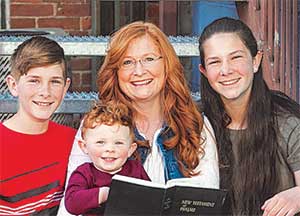April 23, 2025 – Teaching Reading Comprehension


Teaching Reading Comprehension
April 23, 2025
Deborah Wuehler
It’s a Family Affair
Heather Vogler
What Happened?
Alexandria Letkeman
The Thinking Reader: Fostering Advanced Literacy
Hal and Melanie Young
Helping Your Kids Grow in Reading Comprehension

Mercy Every Minute
Deborah Wuehler, TOS Senior Editor
It’s a Family Affair
Beside using curriculum that allows children to think about the text they are reading, I think an organic way to help comprehension is to have family read-alouds while asking good discussion questions. The whole family participates which really expands the knowledge and vocabulary of the youngest ones while reading to the level of the older ones.
Some of our favorite language arts curriculum over the years had built in comprehension questions and discussion. Products like Pathway Readers, Total Language Plus, Bob Jones (BJUPress), and Abeka language arts workbooks helped us in this area of comprehension.
Another aspect in comprehension is to focus on small pieces of copywork from the literature to provide better understanding:
- Comprehension of a passage is easier when broken down for copywork.
- Smaller passages provide opportunities for points of analysis and discussion.
- Copywork encourages comprehension as the student absorbs what he is reading while he is writing.
I have my children copy Scripture until they know it by heart and by hand. Never underestimate the power of the Word of God written on our children’s hearts and minds. It will be their life and health and wisdom—all the things we want our children to possess at the end of this journey.
Dawn Burnette of DGP Publishing says, “Direct and intentional instruction in reading comprehension should be a regular part of each day.” She gives clear and practical help on how to do that: Understanding Literature and Nonfiction Texts: Simple Tools for All Ages and Reading Levels including free downloadable sample forms.
Aimee Otto of Homeschool Compass talks about why we should not turn every book into a reading comprehension quiz, rather, how to make the most of your family read-aloud time: 7 Tips for Getting the Most out of Your Family Read-Aloud Time.
May you read many good books together as a family and learn to comprehend God’s Word together as He grants you perseverance in keeping them Home. Where They Belong.
~Deborah
P.S. Do you use our free app to access The Old Schoolhouse® Magazine? If so, would you please consider leaving a review on either the Google Play or Apple store? We’d love to hear your thoughts on this free resource www.HomeschoolApp.com.
(Copy this link to share this article with a friend.)
For more than twenty-five years, IEW® has offered an effective method that teaches students to write and molds them into confident and competent communicators and thinkers. Try three free weeks at IEW.com/try-SSS

Heather Vogler
What Happened?
My bookworm emerged from her hiding place long enough to reveal that she had finally completed a coveted book series. Money had been pinched, and coins had been collected between couch cushions and car seats. A few childhood toys had even been sold to the highest online bidder. Hours upon hours had been spent hidden away absorbing tales from abroad—all for Dad to respond with, “That’s great! What happened?” He always asks her that question when she completes a book to ensure she understands what she reads.
At first, it was because she is an extremely fast reader, and he wanted to know if she actually retained what she read. The first time he asked her, my husband and I were floored with the details that she remembered. It was incredible. But then, when asked a few months later, she could remember an overview but not the details. This is why giving a summary with several details after reading the material is so important. This does not always need to be done in a formal book report style—but in simple conversation. Having conversations with your children about what they are reading for pleasure when they are young can evolve into quality, in-depth conversations about what they are reading in their high school textbooks.
Now that my daughter is in high school and developing a passion for science, she will freely share what she learned about in her coursework when it relates to everyday life, no questions asked. She is able to see how what she is reading relates to the world around her and able to use it accordingly which is what we want to see in any thriving learner!
(Copy this link to share this article with a friend.)
Heather Vogler, her husband, and five children call the Blue Ridge Mountains of Virginia home where they homeschool and homestead. Heather has homeschooled her children from the beginning and enjoys an eclectic style of teaching. As a freelance writer she has been published in Focus on the Family Magazine, War Cry Magazine, and Brio Magazine. Heather holds a BA in Christian Ministries and currently writes at ThriftSchooling.com.
It’s never too early for kids to learn life skills, like how to pray to God. This kid-friendly guide builds self-reliance in every child! bit.ly/TheBigBookOfLifeSkillsForKids

Alexandria Letkeman
The Thinking Reader: Fostering Advanced Literacy
At the high school level, reading comprehension is more than just a basic understanding of what is being read. At this critical stage, we need to include critical analysis and real-world applications, skills that will prepare them for college and adulthood.
By high school, we have basic building blocks of understanding vocabulary, following the plot or point of a narrative, and simple literary devices. Now students should annotate to deeply engage with the plot, ask hypothetical questions, and examine the author’s purpose—strategies to build critical thinking skills. We aren’t just reading the text, but peeling back the layers of deeper thinking, asking active questions like “Why is this detail significant?” and “How does this action influence the broader narrative?”
Incorporate a wide variety of books—not just non-fiction or the classics, but fictional works, historical documents, scientific papers as well! Reading these different styles will capture the student’s imagination in different ways. While classics offer traditional learning opportunities, contemporary fiction can create personal connections that increase engagement. Remember that an engaged learner learns more.
Now that we have practiced some deeper questioning and analysis, and we have a variety of books to choose from, we need to apply these skills to real life. See where you can help your student relate by using current events, local issues, or global concerns. These connections demonstrate how literature reflects reality and helps students apply comprehension skills in meaningful contexts. Real life applications also mean practicing identifying bias in written works, differentiating between fact and opinion, and examining what information is emphasized versus omitted in politics, religion, advertising, culture, and many more.
Strong reading comprehension creates well-rounded, informed individuals ready to navigate a world of competing viewpoints and complex information. These skills extend far beyond academics into every aspect of adult life.
(Copy this link to share this article with a friend.)
About the author
Alexandria Letkeman began homeschooling with her family in middle school and has recently graduated with honors in 2020. Together with her husband, she has developed a passion for financial literacy, classical writing, and the freedom that homeschooling provides. In pursuit of those passions, she and her husband aim to continue the legacy of The HomeScholar and continue helping homeschool parents homeschool with confidence. One day, Alex plans to start a homesteading farm in Texas featuring mini cows.
Embark on an exciting journey of faith, family, and friendship to a place below earth where goodness grows and darkness fights to walk among us.
www.LaurenHBrandenburg.com

Hal and Melanie Young
Helping Your Kids Grow in Reading Comprehension
Reading comprehension really matters. What’s the point of reading if you don’t understand and retain what you’ve read? How do you teach it, though? Are worksheets with comprehension questions what you need? No, those just test whether or not kids understand, but they don’t teach them how to understand.
There are three super simple ways to teach our kids to better understand what they’ve read:
Read alouds. Read aloud to your kids and have them read aloud to you. Then teach them to read a passage out loud if they are struggling to understand it. We can understand a higher level of language when we hear it spoken than we can when we read it. Leverage that to increase understanding.
Audiobooks. Audiobooks mean reading aloud doesn’t depend on you having time to sit down with a book! You can listen in the van, while you are all folding laundry, or doing chores. A child can listen with earbuds even if everyone else is busy. Audiobooks are especially useful for struggling readers.
Audiobooks teach kids what the written word sounds like and how to follow a thought through a complex sentence and paragraph—and that is reading comprehension! A child who’s been listening to well-written audiobooks is going to fly ahead in reading ability once their processing skills click in. Also, getting them engaged in stories makes them want to read for themselves.
Discussion. One of the very best things you can do to help your kids grow in reading comprehension is to just talk about books with them. Before they read, give them some things to watch for. After they read, talk about it. Ask them the things you told them to watch for, but go deeper. Ask who, what, and when questions, but also ask how and why. Get excited and your kids will, too—you are the most important motivator in your kids’ education.
Freebie! Get a free taste of our audiobooks with six stories from Theodore Roosevelt’s Hero Tales from American History – click here: https://www.raisingrealmen.com/prespromo/
Your friends,
Hal & Melanie
(Copy this link to share this article with a friend.)
About the author
Hal and Melanie Young have been homeschooling almost as long as they’ve been married, and they’re still happy with both decisions! They wrote My Beloved and My Friend: How to Be Married to Your Best Friend Without Changing Spouses to encourage their young adults – find out more at raisingrealmen.com.
A division of The Old Schoolhouse®
SchoolhouseTeachers.com Corner
Did you know?
Every class is INCLUDED for ultimate members!
No limits.
Learning to read should be exciting—not stressful! Teaching Reading through Play on SchoolhouseTeachers.com makes reading comprehension fun and natural for young learners with a full year of games, activities, and engaging lessons. Through play-based learning, your child will build reading confidence, develop comprehension skills, and discover the joy of books—all while having fun! Check it out today on SchoolhouseTeachers.com.
Every homeschool journey is unique, and we want to hear about yours! Tell us what inspires you, what curriculum fits your family best, and how homeschooling has shaped your life. Your feedback helps The Old Schoolhouse® continue to serve families with meaningful resources. Take a few moments to share your thoughts! HomeschoolSurvey.com


Worried your child has a reading delay? Help is here. In Episode 42 of the Hey, Mama! Homeschool Show—“What if My Reader Is Delayed,” Stephanie Morrison outlines practical measures you can take—beginning today. Find more helpful tips on HomeschoolShow.com.
Foraging for mushrooms opens a world of opportunity for family bonding and educating your children. (Find this and other articles at HomeschoolApp.com.)
Share this newsletter with a friend, and be sure to let those CONSIDERING homeschooling know about the enormous FREE info-pack which awaits them here: www.TryHomeschooling.com.
| We Want Your Feedback! |
| If you liked today’s Homeschool Minute, please email the editors and tell us what part you liked most. It’s a huge blessing to receive feedback! Please add publisher@theoldschoolhouse.com to your email contacts so that our emails to you don’t land in spam. |
DISCLAIMER: The Old Schoolhouse® and its staff do not necessarily endorse or agree with the articles, images, advertisements, or other content appearing in The Homeschool Minute, on any linked website, or otherwise. The views and opinions or other matters expressed in this newsletter are not necessarily those of the publishers, editors, staff, contractors, associates, or other affiliates of The Old Schoolhouse®






